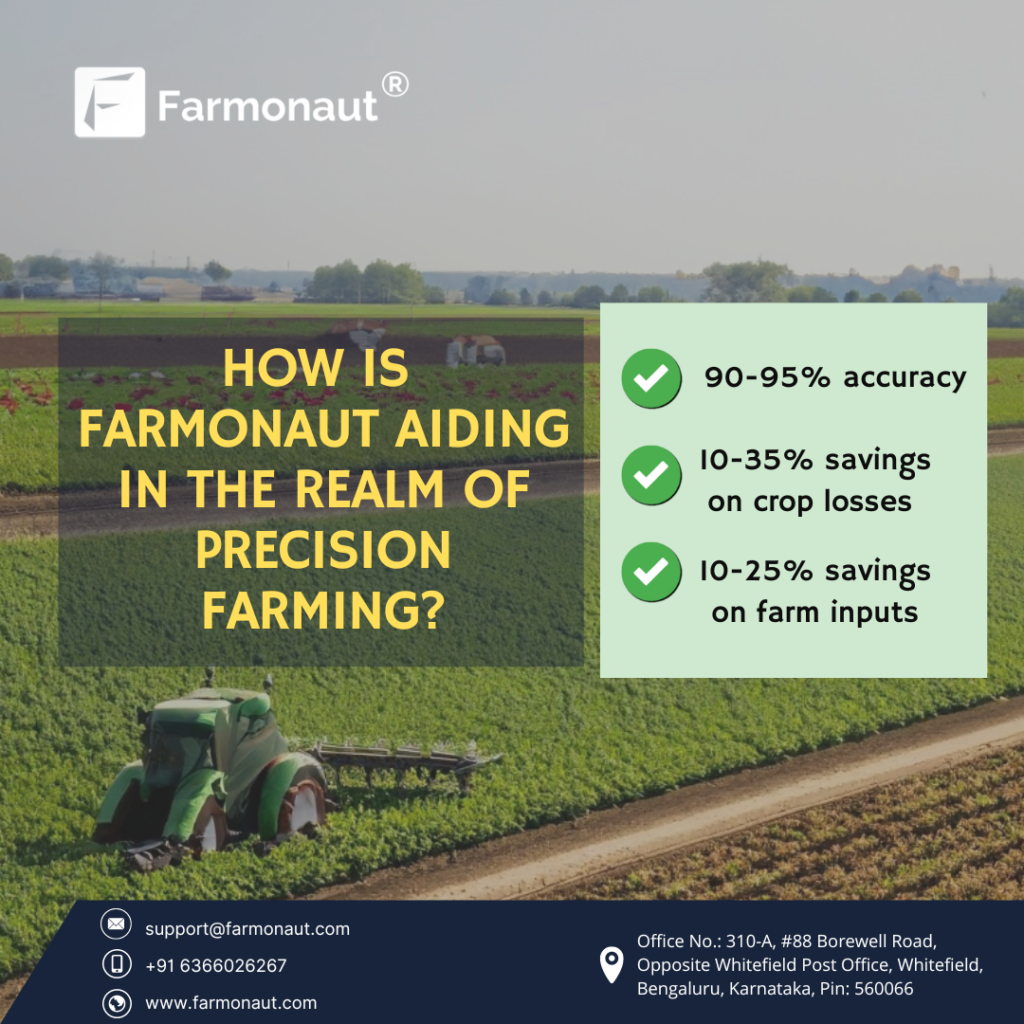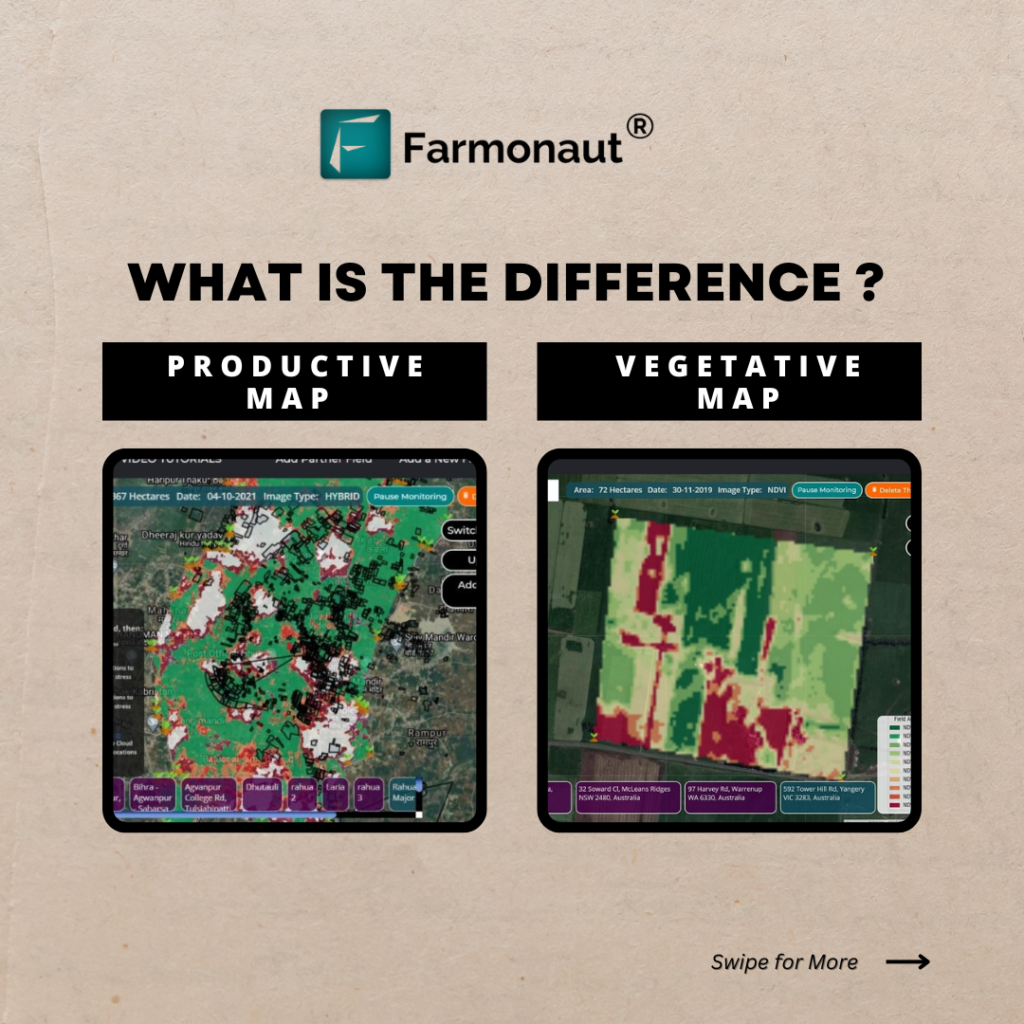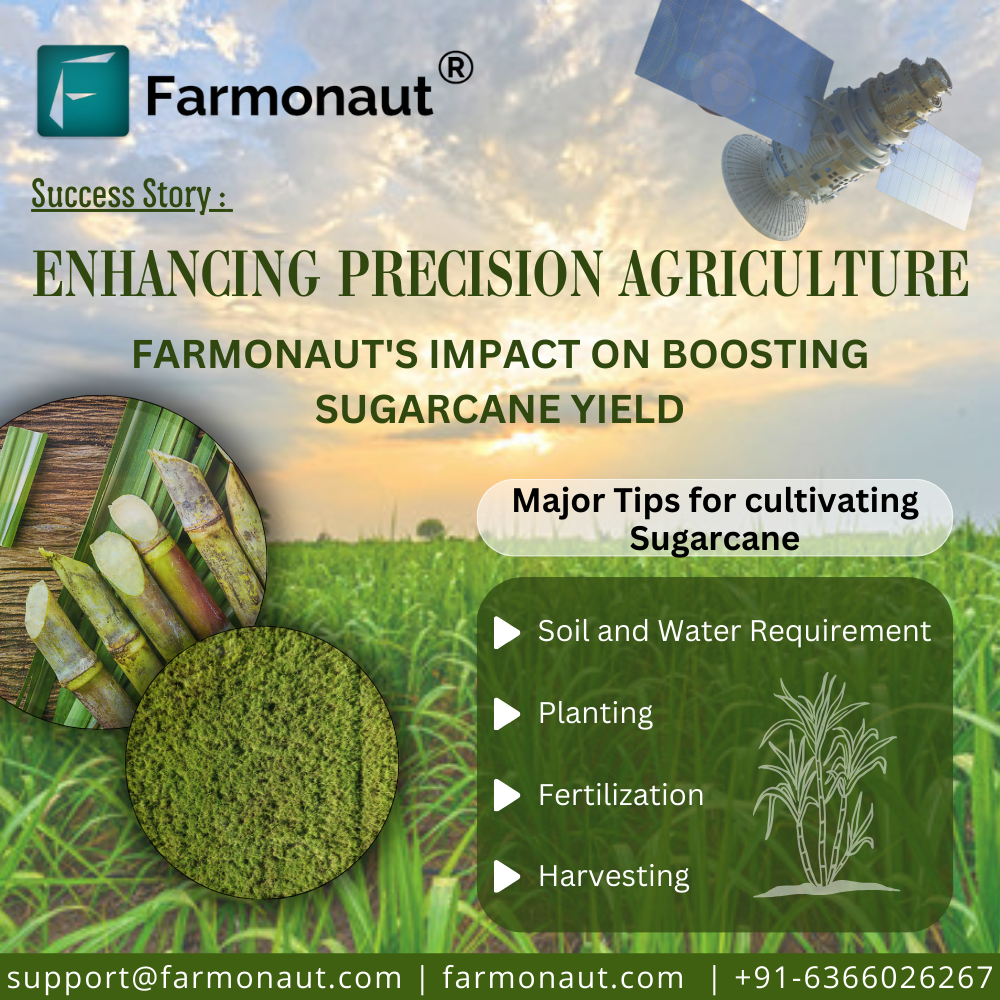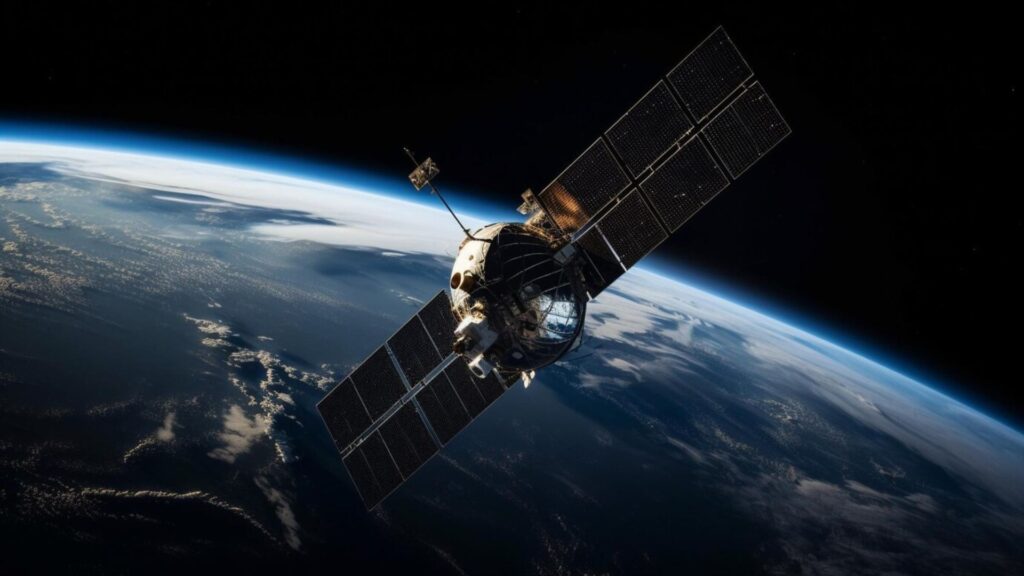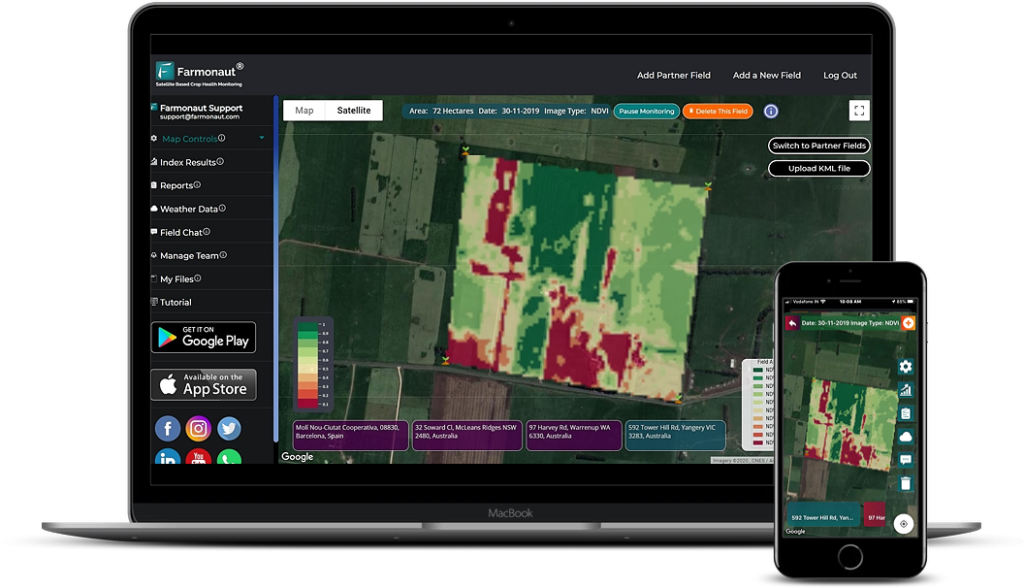Unlock Precision Agriculture: Farmonaut’s Guide to Mobile Data Collection for Optimized Food Retail Assessment
“The Food Retail Setting-Level Assessment Questionnaire (SLAQ) evaluates and improves food environments in up to 100 different aspects.”
Welcome to Farmonaut’s comprehensive guide on revolutionizing food retail assessment and healthy eating initiatives through innovative mobile data collection tools. In this blog post, we’ll explore how precision agriculture and advanced technology are transforming the way we evaluate and improve food environments, with a special focus on the evolution of the Food Retail Setting-Level Assessment Questionnaire (SLAQ).
As pioneers in agricultural technology, we at Farmonaut are committed to making precision agriculture accessible and affordable for farmers worldwide. Our satellite-based farm management solutions, available through Android, iOS, web apps, and API, integrate cutting-edge technology with data-driven insights to enhance traditional farming practices.
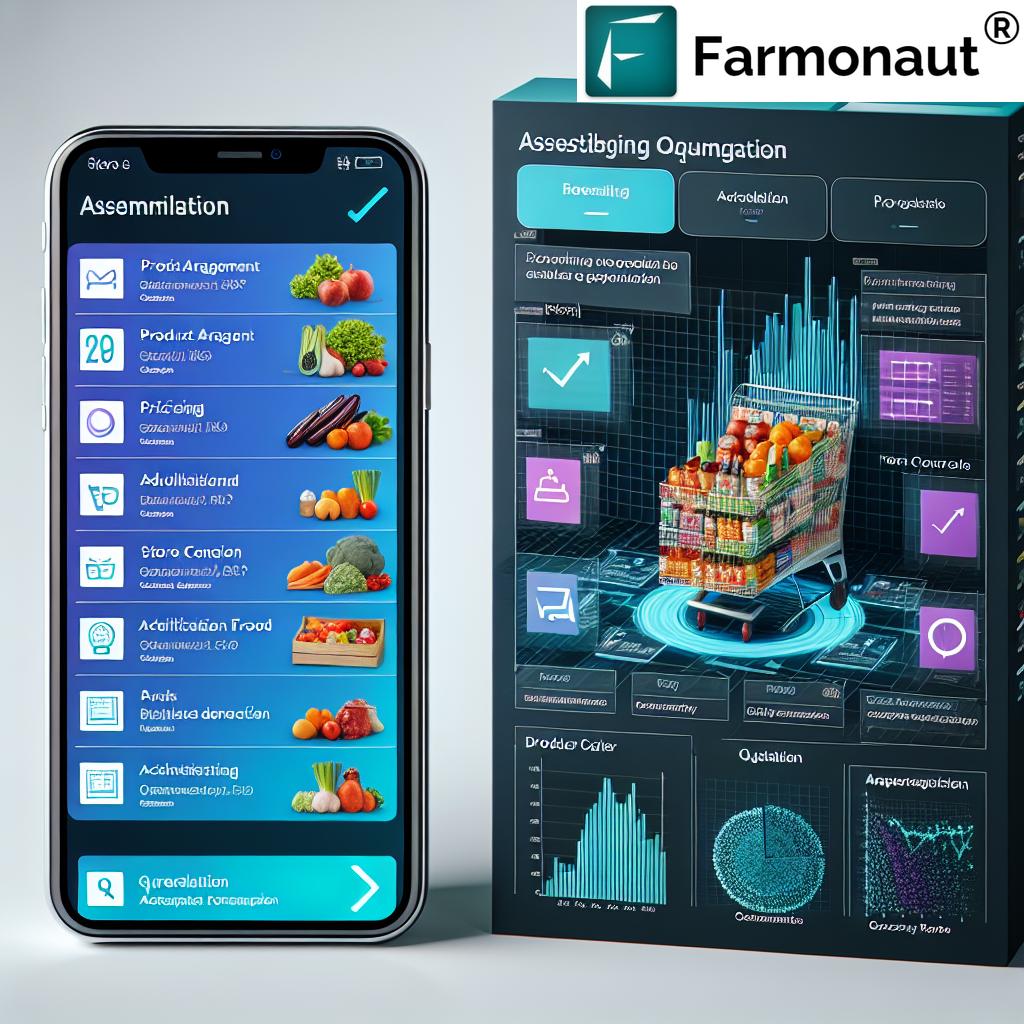
The Evolution of Food Retail Assessment
The food retail landscape has undergone significant changes in recent years, with an increasing focus on creating healthier food environments and promoting nutrition-focused community development. To effectively assess and improve these environments, tools like the Food Retail Setting-Level Assessment Questionnaire (SLAQ) have been developed.
SLAQ is designed to evaluate various aspects of food retail settings, including product availability, pricing, placement, and promotion. This comprehensive tool helps researchers, policymakers, and store owners identify areas for improvement and implement strategies to create healthier food retail spaces.
Key Components of SLAQ
- Product availability assessment
- Pricing strategies evaluation
- Product placement analysis
- Promotional activities review
- Store layout and design assessment
By utilizing SLAQ, stakeholders can gain valuable insights into the current state of food retail environments and develop targeted interventions to promote healthier choices.
The Role of Mobile Data Collection in Food Retail Assessment
As technology continues to advance, mobile data collection tools have emerged as game-changers in the field of food retail assessment. These innovative solutions offer numerous advantages over traditional paper-based surveys, including:
- Increased efficiency and accuracy
- Real-time data collection and analysis
- Reduced environmental impact
- Enhanced data security and storage
- Improved collaboration among team members
At Farmonaut, we recognize the potential of mobile data collection in revolutionizing food retail assessment. Our platform leverages satellite imagery, artificial intelligence, and machine learning to provide valuable insights for various agricultural applications, including retail food availability assessment.

Farmonaut’s Contribution to Food Retail Assessment
Our satellite-based crop health monitoring system can be adapted to assess food retail environments by providing valuable data on:
- Local crop production and availability
- Supply chain efficiency
- Seasonal variations in food availability
- Environmental factors affecting food retail
By integrating this data with traditional SLAQ assessments, we can provide a more comprehensive understanding of food retail environments and their impact on community health.
Behavioral Economics in Food Retail
Understanding and applying behavioral economics principles is crucial for optimizing food retail environments. These strategies can significantly influence consumer choices and promote healthier eating habits. Let’s explore some key behavioral economics strategies used in agricultural marketing:
1. Product Placement
Strategic product placement can nudge consumers towards healthier choices. For example:
- Placing fruits and vegetables at eye level
- Positioning healthier options near checkout counters
- Creating dedicated “healthy zones” within stores
2. Signage Optimization
Effective signage can draw attention to healthier products and educate consumers:
- Using color-coded labels to indicate nutritional value
- Highlighting local and seasonal produce
- Providing easy-to-understand nutritional information
3. Pricing Strategies
Innovative pricing approaches can make healthier options more attractive:
- Offering bulk discounts on fresh produce
- Implementing loyalty programs that reward healthy choices
- Using price comparisons to showcase the value of nutritious options
By incorporating these behavioral economics strategies into food retail assessments, we can create environments that naturally guide consumers towards healthier choices.
“Mobile data collection tools can increase efficiency in food retail assessments by up to 40% compared to traditional paper surveys.”
Comparing Data Collection Methods for Food Retail Assessment
To better understand the advantages of mobile data collection in food retail assessment, let’s compare various methods using a comprehensive table:
| Data Collection Method | Pros | Cons | Efficiency Score (1-10) | Accuracy Score (1-10) | Cost-Effectiveness Score (1-10) | Best Used For |
|---|---|---|---|---|---|---|
| Traditional Paper Surveys |
|
|
4 | 6 | 5 | Small stores, limited budget projects |
| Mobile Apps (e.g., Farmonaut) |
|
|
9 | 9 | 8 | Large-scale assessments, chain stores |
| Web-based Questionnaires |
|
|
7 | 7 | 8 | Remote assessments, self-reporting |
| In-Person Interviews |
|
|
5 | 8 | 4 | In-depth studies, small sample sizes |
As evident from the table, mobile apps like Farmonaut offer significant advantages in terms of efficiency, accuracy, and cost-effectiveness for food retail assessments, especially for large-scale projects and chain stores.
Implementing Mobile Data Collection for Food Retail Assessment
Now that we’ve established the benefits of mobile data collection, let’s explore how to implement these tools effectively for food retail assessment:
- Choose the right platform: Select a mobile data collection platform that aligns with your specific needs, such as Farmonaut’s comprehensive agricultural technology solutions.
- Design user-friendly questionnaires: Create digital versions of SLAQ and other retail food availability instruments that are easy to navigate on mobile devices.
- Train your team: Provide thorough training to ensure all team members are comfortable using the mobile data collection tools.
- Pilot test: Conduct a small-scale pilot to identify and address any issues before full-scale implementation.
- Integrate with existing systems: Ensure the mobile data collection platform can integrate seamlessly with your existing data management systems.
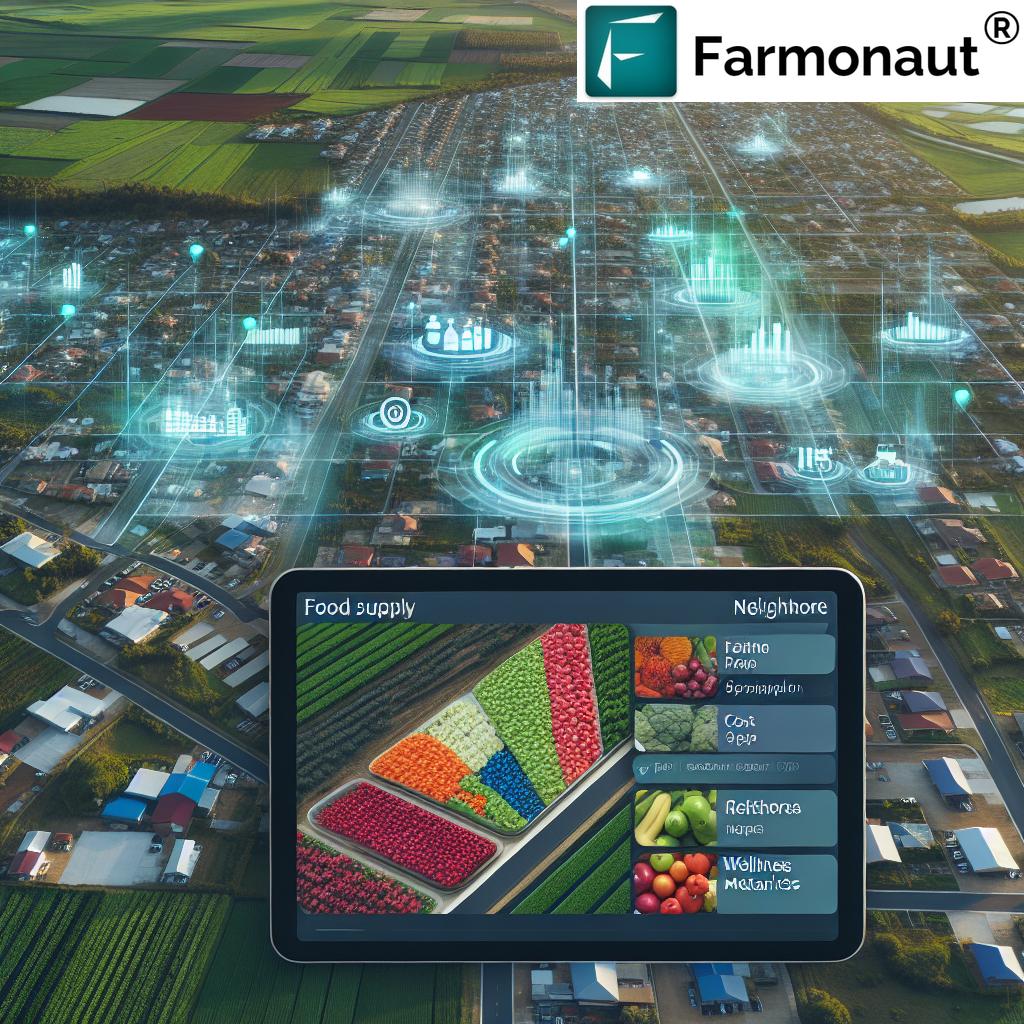
Farmonaut’s Mobile Data Collection Solutions
At Farmonaut, we offer a range of mobile data collection solutions that can be adapted for food retail assessment:
- Satellite-Based Crop Health Monitoring: While primarily used for agriculture, this technology can be applied to assess local food production and availability, influencing retail assessments.
- AI-Powered Advisory System: Our Jeevn AI can be customized to provide insights on optimal product placement and pricing strategies based on local agricultural data.
- Blockchain-Based Traceability: This feature can be used to track the journey of food products from farm to retail, enhancing transparency in food retail assessments.
Access Farmonaut’s API Developer Docs
The Impact of Mobile Data Collection on Community Health Interventions
Implementing mobile data collection tools for food retail assessment can have a significant positive impact on community health interventions:
- More Accurate Data: Real-time data collection reduces errors and provides a more accurate picture of food retail environments.
- Faster Response Times: Quicker data analysis allows for more timely interventions and policy implementations.
- Targeted Interventions: Detailed data enables local health departments to create more targeted and effective interventions.
- Improved Monitoring: Continuous data collection facilitates better monitoring of intervention effectiveness over time.
- Enhanced Collaboration: Mobile platforms allow for easier sharing of data among stakeholders, fostering collaboration in community health initiatives.
Case Study: Mobile Data Collection in Action
While we can’t provide specific case studies, let’s explore a hypothetical scenario to illustrate the potential of mobile data collection in food retail assessment:
Imagine a mid-sized city implementing a healthy eating initiative. Using Farmonaut’s mobile data collection tools, they conduct comprehensive assessments of all food retail outlets in the area. The real-time data collection allows them to quickly identify neighborhoods with limited access to fresh produce. By integrating this information with local agricultural data from Farmonaut’s satellite monitoring, they develop targeted interventions, such as:
- Incentivizing local farmers to supply underserved areas
- Implementing mobile fruit and vegetable markets
- Providing tailored nutrition education programs based on local food availability
The continuous data collection enables the city to monitor the impact of these interventions in real-time, making necessary adjustments to maximize effectiveness.
Download Farmonaut’s Android App

Future Trends in Food Retail Assessment
As we look to the future, several trends are likely to shape the landscape of food retail assessment:
- Integration of IoT Devices: Internet of Things (IoT) sensors could provide real-time data on product freshness, inventory levels, and customer behavior.
- Artificial Intelligence and Machine Learning: Advanced AI algorithms could analyze complex datasets to predict trends and optimize retail strategies.
- Augmented Reality (AR) Assessments: AR technology could allow for virtual walk-throughs of stores, enhancing remote assessment capabilities.
- Blockchain for Supply Chain Transparency: Blockchain technology could provide unprecedented transparency in food supply chains, influencing retail assessments.
- Personalized Nutrition Recommendations: Mobile apps could offer personalized nutrition advice based on individual health data and local food availability.
At Farmonaut, we’re constantly innovating to stay at the forefront of these trends, ensuring our solutions remain cutting-edge and effective for food retail assessment and beyond.
Challenges and Considerations
While mobile data collection offers numerous benefits for food retail assessment, it’s important to consider potential challenges:
- Data Privacy and Security: Ensuring the protection of sensitive information collected during assessments.
- Technology Adoption: Overcoming resistance to new technologies, especially in traditional retail settings.
- Connectivity Issues: Addressing potential internet connectivity problems in rural or underserved areas.
- Training and Support: Providing adequate training and ongoing support for users of mobile data collection tools.
- Integration with Existing Systems: Ensuring seamless integration with existing data management and analysis systems.
At Farmonaut, we’re committed to addressing these challenges through robust security measures, user-friendly interfaces, offline functionality, comprehensive training programs, and flexible integration options.

Conclusion: Transforming Food Retail Assessment with Mobile Data Collection
As we’ve explored throughout this guide, mobile data collection tools are revolutionizing food retail assessment and healthy eating initiatives. By leveraging advanced technologies like those offered by Farmonaut, stakeholders can gain unprecedented insights into food retail environments, implement more effective interventions, and ultimately improve community health outcomes.
The integration of satellite imagery, AI-powered analytics, and blockchain-based traceability opens up new possibilities for comprehensive, data-driven approaches to food retail assessment. As we move forward, the continued evolution of these technologies promises to further enhance our ability to create healthier, more sustainable food environments for communities worldwide.
We invite you to explore Farmonaut’s suite of agricultural technology solutions and consider how they can be adapted to support your food retail assessment initiatives. Together, we can unlock the full potential of precision agriculture and mobile data collection to optimize food retail environments and promote healthier communities.
FAQ Section
Q: How can Farmonaut’s technology be applied to food retail assessment?
A: While Farmonaut primarily focuses on agricultural applications, our satellite-based crop monitoring, AI analytics, and blockchain traceability can be adapted to provide valuable insights for food retail assessments, such as local food availability, supply chain efficiency, and product origin verification.
Q: Is mobile data collection more cost-effective than traditional methods?
A: Yes, in most cases, mobile data collection proves more cost-effective in the long run due to reduced manual data entry, faster analysis, and elimination of paper-based costs.
Q: How can small store owners benefit from mobile data collection tools?
A: Small store owners can use mobile data collection tools to streamline inventory management, track sales patterns, and make data-driven decisions about product placement and pricing strategies.
Q: What training is required to implement mobile data collection for food retail assessment?
A: Training requirements vary depending on the specific tools used, but generally include familiarization with the mobile app interface, data collection protocols, and basic troubleshooting. Farmonaut offers comprehensive training resources for our platforms.
Q: How does mobile data collection support policy, systems, and environmental interventions?
A: Mobile data collection provides real-time, accurate data that can inform policy decisions, help identify systemic issues in food retail environments, and support the development and monitoring of targeted environmental interventions.


